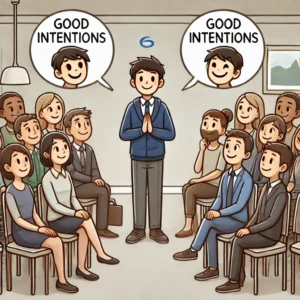In our everyday interactions, whether online or in-person, we constantly face situations where our good intentions might be misunderstood. We act with goodwill, but sometimes, our actions or words are misinterpreted, causing others to view us negatively.
This phenomenon is encapsulated in the biblical phrase, “Don’t let your good be evil spoken of.” Essentially, it serves as a reminder to live in such a way that our good deeds and kind intentions are not overshadowed by misinterpretation, misunderstanding, or miscommunication.
This blog explores the meaning behind this phrase, why it is still relevant in today’s world, and how we can ensure our good deeds and actions are not misrepresented. By using practical examples, life lessons, and targeted strategies, we can ensure that our kindness is perceived in the way we intend it to be.
Understanding the Meaning of “Don’t Let Your Good Be Evil Spoken Of”

At its core, this phrase means that we should be careful in how we present our actions, choices, and words so that they are not misunderstood or seen in a negative light. Good intentions are not always enough. For instance, an act of charity may be seen as condescending if not communicated properly or conducted with sensitivity.
In the Bible, Romans 14:16 states: “Do not let what you know is good be spoken of as evil.” The context refers to maintaining peace and unity within the Christian community, encouraging believers to act with consideration for how their actions might affect others.
This advice, though ancient, is still immensely valuable in modern times, where misunderstandings can easily arise, especially in a world dominated by social media and instant communication.
Why Do Good Intentions Go Wrong?
One of the main reasons good intentions can be perceived negatively is the lack of clear communication. In today’s fast-paced world, many people do not take the time to thoroughly explain their actions or motives, assuming others will automatically understand. This can lead to misunderstandings, perplexion, and even resentment.
Practical Examples of How Good Intentions can be Misinterpreted
The Gift That Offends
Imagine gifting a close friend an expensive item that you think will help them. Perhaps you give them a book on personal finance because you believe it will assist them in managing their money.
While your intention is pure, they might interpret it as an insult, assuming you think they are financially irresponsible. Without the proper context or explanation, your act of kindness may be viewed as condescending.
Feedback Gone Wrong
In a workplace, offering constructive criticism to a colleague with the intention of helping them improve can sometimes backfire. If the feedback is not delivered carefully, the recipient might feel attacked or judged, rather than helped. Here, the issue is not the intention but how the message is conveyed.
Social Media Posts
In the age of social media, many well-meaning posts are misunderstood. For instance, a celebrity may post about a charity they support, but without fully understanding the implications or being aware of cultural sensitivities. The post, though well-intended, can spark backlash if it is seen as tone-deaf or self-serving.
In all these cases, it’s clear that good intentions can go awry if not communicated properly or if the other party is not receptive.
How to Ensure Your Good is Not Evil Spoken Of

Here are some strategies to ensure that your good intentions are perceived positively and are not misinterpreted:
Clarity in Communication
One of the biggest culprits of misunderstandings is unclear communication. Whether you’re engaging with someone in person, through a message, or over social media, make sure to clarify your intentions. Don’t assume that your good deed will be interpreted as such—make your motives clear, especially when there is a potential for misinterpretation.
Practical Tip
When offering help or giving feedback, explain the “why” behind your actions. For example, “I got you this book because I found it helpful, and I thought you might like it too,” can help avoid misunderstandings about your intentions.
Be Mindful of Cultural Sensitivities
What is considered good and kind in one culture may not be seen the same way in another. Especially in our globalized world, it’s important to be aware of cultural differences. Whether it’s in the language you use or the actions you take, understanding cultural sensitivities can help prevent your good actions from being misunderstood.
Practical Tip
Before offering help or expressing your intentions, take a moment to consider if there are cultural or societal norms that might affect how your actions are perceived.
Timing Matters
The right action at the wrong time can still be perceived negatively. Even if your intentions are good, timing plays a huge role in how your actions are interpreted. For instance, offering unsolicited advice to someone in a vulnerable state, even with the best intentions, can come off as intrusive or insensitive.
Practical Tip
Pay attention to the situation before you act. Sometimes waiting for a better moment can ensure that your good intentions are received as intended.
Know Your Audience
Every individual has different emotional triggers and personal experiences that shape how they perceive the world. Knowing the person you are engaging with can help you tailor your actions and words to ensure they are well-received.
Practical Tip
If you are unsure how your actions will be interpreted, ask yourself how the other person might feel. Empathy is key in avoiding misunderstandings.
Social Media and Public Perception
On social media, where millions of people can see and interpret your actions, it’s even more critical to think before you post. Even well-meaning posts can be seen in a negative light if they are not worded carefully or if they touch on sensitive topics.
Practical Tip
When posting online, consider the broader impact of your words. Is your message clear? Could it be taken out of context? If in doubt, it’s better to revise or reconsider the post before sharing it with the world.
The Importance of Personal Responsibility

While misunderstandings can happen, it is our personal responsibility to manage how our actions are perceived. This doesn’t mean we need to tiptoe around everyone’s feelings, but we should be mindful of the potential impact of our words and deeds. Practicing empathy, clear communication, and cultural awareness can significantly reduce the chances of our good being spoken of as evil.
Taking ownership of how we present ourselves and how we communicate with others is a vital part of building healthy relationships, both personally and professionally. In the workplace, for example, leadership qualities such as transparent communication and empathy are highly valued. Leaders who are mindful of how their actions are perceived by their team tend to foster a more positive and productive work environment.
Practical Example
The Importance of Feedback Loops
In a corporate environment, managers often struggle with giving feedback to employees. A common mistake is offering criticism without providing a context or a way forward. For example, telling someone, “Your presentation lacked clarity,” without explaining why or how they can improve, might leave them feeling demoralized.
A better approach
“Your presentation and your expression had great points, but it would have been more effective with clearer transitions. Maybe next time, try using bullet points to guide the audience through your key ideas.” This type of feedback ensures that the recipient understands your good intentions without feeling judged or belittled.
Role of Good Intentions in Business
Good intentions are critical in business as they create a foundation of trust, integrity, and long-term success. When business owners, leaders, and employees act with good intentions, they prioritize the well-being of customers, employees, and other stakeholders. Here’s how good intentions play a key role:
Building Trust and Reputation: Businesses that operate with transparency and genuine concern for their customers’ needs build strong reputations. Trust is the milestone of any successful business, and good intentions help build that trust by ensuring honesty and ethical practices in dealings, whether it’s through fair pricing, delivering quality products, or offering exceptional customer service.
Fostering Strong Relationships: Good intentions in business lead to better relationships with employees, partners, and clients. When businesses focus on mutually beneficial goals rather than self-interest, partnerships and customer loyalty flourish, creating sustainable growth.
Driving Ethical Decision-Making: Businesses driven by good intentions make decisions that are not only profitable but also ethical. This includes practices such as fair labor policies, environmental responsibility, and corporate social responsibility initiatives. Companies like Patagonia and Ben & Jerry’s are examples of businesses with good intentions that emphasize both profitability and societal good.
Long-Term Growth and Success: Good intentions lead to a positive culture, improved employee morale, and customer loyalty, which contribute to long-term business success. In the long run, businesses that prioritize ethics and goodwill tend to outperform those focused solely on profit.
Role of Good Intentions in Job
Good intentions in the workplace help create a positive environment, where employees feel motivated, respected, and empowered.
They play a crucial role in enhancing productivity, employee satisfaction, and fostering a collaborative atmosphere:
Enhancing Collaboration: When employees and managers operate with good intentions, it encourages teamwork and collaboration.
Instead of competing against each other, colleagues work together to achieve common goals, knowing that they are respected and supported.
Good intentions ensure that personal agendas don’t overshadow the collective objective.
Boosting Morale and Motivation: Employees who feel that their colleagues and supervisors have good intentions are more likely to feel valued and motivated.
Good intentions foster kindness, understanding, and recognition of each other’s contributions, which boosts morale and overall job satisfaction.
Creating a Positive Workplace Culture: A workplace culture built on good intentions promotes empathy, fairness, and open communication.
Managers who lead with good intentions show genuine concern for the well-being of their teams, leading to a more engaged and happy workforce. It creates and leads to lower turnover rates and higher employee retention.
Encouraging Professional Development: Employees with good intentions are more likely to help their colleagues grow by sharing knowledge and mentoring.
This creates a culture of continuous learning and development, where individuals are encouraged to pursue both personal and organizational growth.
Role of Good Intentions in Relationships
Good intentions are at the heart of any healthy and successful relationship, whether personal or professional. They nurture trust, understanding, and emotional security, helping partners, friends, or colleagues build stronger, more meaningful connections.
Strengthening Emotional Bonds: Good intentions ensure that actions in a relationship come from a place of care and love.
When both partners in a relationship have good intentions, they naturally support each other, communicate openly, and work together to build a deeper emotional connection.
This foundation of care allows both parties to feel valued and understood.
Encouraging Mutual Respect: Relationships where good intentions are present allow for mutual respect and fairness.
Partners are more likely to understand and consider each other’s feelings, opinions, and needs. This respect helps prevent conflicts and makes it easier to resolve issues when they do arise.
Promoting Forgiveness and Understanding: In any relationship, misunderstandings and conflicts are inevitable.
However, if both people act with good intentions, they are more likely to be forgiving and understanding. They know that mistakes happen but trust that their partner’s intent was not harmful.
This mindset leads to quicker resolutions and stronger relationships over time.
Supporting Long-Term Commitment: Good intentions lead to thoughtful actions that build a strong foundation for long-term commitment.
Whether in romantic relationships, friendships, or family dynamics, consistently acting with care, kindness, and consideration helps relationships weather challenges and grow stronger.
Magical Impact of Good Intentions

The magical impact of good intentions lies in their ability to transform situations, relationships, and even individual well-being in ways that feel almost effortless, yet powerful.
When you approach life with pure, positive intentions, several “magical” effects unfold:
-
Attracting Positive Energy
Good intentions radiate positivity, and in return, they attract positive outcomes. When you intend to help others or do good, you often receive goodwill, opportunities, and support from unexpected sources.
This effect can feel like serendipity, where your genuine kindness invites favorable circumstances.
-
Strengthening Relationships
In personal and professional relationships, people intuitively sense genuine intentions. Good intentions create deeper trust, stronger bonds, and emotional security.
Even in times of conflict, if both parties know the intentions are pure, misunderstandings resolve more easily, and relationships thrive.
-
Building Personal Growth
Acting with good intentions fosters inner peace and personal growth. When you live with integrity and focus on positive outcomes for others, it nurtures self-worth and boosts confidence.
This internal harmony helps you grow as a person and find fulfillment in everyday life.
-
Creating Ripple Effects
Good intentions have a ripple effect, positively influencing those around you. Acts of kindness, generosity, and ethical behavior inspire others to adopt similar behaviors, spreading goodwill.
This chain reaction can improve communities, workplaces, and society, making the world a better place.
-
Enhancing Problem-Solving
Good intentions sharpen your problem-solving abilities. When faced with challenges, those with pure intentions are more likely to think creatively and find solutions that benefit everyone.
This mindset reduces stress and opens up unexpected paths to success.
-
Increasing Resilience
In times of difficulty or failure, good intentions provide emotional resilience. Knowing that your motives were positive, you can handle setbacks with greater ease, learning from mistakes without guilt.
This keeps your spirit strong and your optimism intact.
-
Boosting Success and Prosperity
Surprisingly, good intentions often lead to success in both business and personal endeavors. Ethical businesses, leaders with integrity, and kind-hearted individuals often attract loyal customers, employees, and supporters, contributing to long-term prosperity.
In essence, the “magical” impact of good intentions is their ability to unlock doors to personal growth, stronger relationships, and success by radiating positivity and goodwill. These unseen but powerful effects create a harmonious and fulfilling life.
Final Thoughts
Leading with Integrity
At the end of the day, the best way to ensure that your good is not spoken of as evil is to lead with integrity. When your actions are genuinely rooted in kindness and empathy, they are more likely to be perceived in a positive light. That said, no matter how well-intended you are, there will always be individuals who may still misinterpret your actions.
In such cases, it’s important to stay grounded in your values, clarify where needed, and move forward without letting negativity drag you down.
Summary
The phrase “Don’t let your good be evil spoken of” is a timeless reminder that our actions should not only be rooted in kindness but also be mindful of how they are perceived. By focusing on clarity, empathy, and cultural awareness, we can ensure that our good deeds are seen for what they are: genuine efforts to help, uplift, and support others.
Key Takeaways:
Good intentions alone aren’t enough; clear communication is key.
Be attentive of cultural and personal sensitivities as well as activities.
Timing and context matter when offering help or advice.
Take personal responsibility for how your actions are perceived.
Lead with integrity, even in the face of misunderstanding.
By following these guidelines, we can ensure that our good actions speak for themselves, avoiding misinterpretation and ensuring that we spread positivity in all areas of life.
Frequently Asked Questions
* What are good intentions?
Good intentions are the desire to do something positive or beneficial for others.
- What does good intentions mean?
It means having honest and positive motives behind actions.
- What is the saying of good intentions?
“The road to hell is built and made with good intentions” implies that good intentions alone are not enough without proper actions.
- Good intentions in life
In life, good intentions guide positive behaviors and decisions aimed at kindness and well-being.
- Good intentions synonyms
Benevolence, goodwill, sincerity, kindness, and altruism.
- Good intentions quotes
“Good intentions are not enough; they’ve never put an onion in the soup yet.” – Sonya Levien.
- I have good intentions meaning
It means that your actions are driven by a desire to do good or help others.




